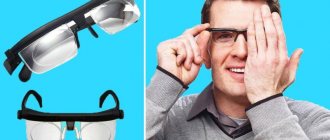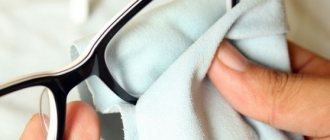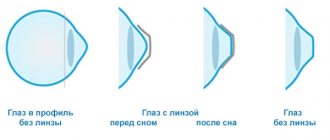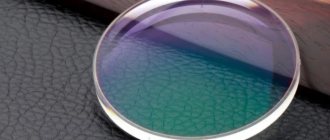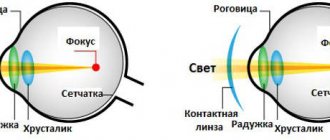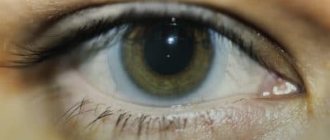Millions of Russians experience vision problems. The most common of them is myopia. According to Rospotrebnadzor, from 30% to 50% of children acquire this disease by the end of school. Today, there are two non-surgical methods of vision correction - glasses and contact lenses. Both methods have both supporters and opponents. AiF.ru spoke about the pros and cons of glasses and lenses ophthalmologist Natalya Voroshilova.
Question and answer Will night lenses help restore vision in an adult?
Advantages of spectacle correction devices
Today, most people with refractive errors prefer to wear regular glasses. Modern technologies make it possible to produce eyeglass optics that are very light, compact and beautiful. Previously, people had to get used to glasses for a long time, use models with thick lenses, which visually increase the size of the eyes and look unaesthetic.
Glass production methods are constantly being improved. You can purchase plastic, metal and horn frames, lenses made of glass and polycarbonate or with various protective layers. Moreover, the number of contraindications to spectacle optics is decreasing. We can safely talk about the following advantages:
- The simplest correction method. No special skills are required to wear and care for glasses.
- Easy to care for glass. To do this, you only need to purchase a special napkin and a case for storing optical products.
- Comfortable to wear while wearing makeup.
- They do not cause allergic conjunctivitis and infectious eye diseases, since there is no direct contact of the glasses with the eyes.
- The ability to change your appearance with stylish and fashionable frames.
- Availability and large selection of different models. Almost everyone can choose good optics for themselves. Glasses are available in a wide price range - from the cheapest to the very expensive.
- Long service life. If you take care of your eyeglass optics and take care of them, they will last for many years. It is necessary to select a new pair only in cases where the vision indicator changes.
Glasses also have disadvantages, which should also be listed to complete the picture.
Benefits of glasses
Let's list the advantages of wearing glasses:
- Practical to use. Can be taken off or put on at any time.
- There is no close contact with the eyes, which eliminates the possibility of developing eye diseases.
- Improves and allows for increased clarity of vision.
- They protect the eyes from dust and debris.
- The glasses are easy to care for.
- The service life of glasses depends on how carefully the user handles them.
- You can change your style with glasses.
- As a rule, they are inexpensive and accessible to most people.
- If you want to cry, cry, glasses will not interfere with this.
A comparison of glasses and lenses cannot fail to highlight the merits of the latter.
Disadvantages of spectacle optics
Their list is quite extensive. But it is worth considering the fact that many of the “cons” are relative and temporary. Much depends on the perception of the features of spectacle optics by each individual person. We list the most obvious disadvantages:
- Not everyone is happy with the change in appearance created by glasses. Some people are embarrassed to wear them.
- Forced restrictions when playing sports and active lifestyle. Glasses fall off your face, fog up, and can cause injury.
- Difficulty wearing sunglasses. You have to purchase more expensive models with diopters and a polarization effect.
- The need to always keep glasses with you.
- Narrowing of visual fields, which is especially noted by drivers.
- Long adaptation to spectacle lenses with strong diopters for the correction of high degrees of refractive error.
- An unaesthetic type of optics for correcting astigmatism and presbyopia.
- Problems wearing glasses in rain or snow. Drops falling on the glass reduce visibility.
There are quite a lot of disadvantages. These may also include contraindications.
Pros and cons of glasses
Despite the fact that glasses are indeed considered an outdated tool for vision correction, they have a number of advantages :
- They cost much less , provided that you do not consider custom-made products, but compare two types of optics that are approximately equal in dioptric power and purpose.
- Glasses are much more practical in terms of use : you can put them on and take them off in just a couple of seconds, while putting on lenses requires more time and some experience.
- From an aesthetic point of view, these products are an excellent addition to the image , but only if the frame is chosen well and in accordance with the rules for compatibility of the frame with the type of face.
- The service life depends solely on the care of the owner , while contact lenses must be changed at a certain period, regardless of how carefully they are handled.
But they also have a number of disadvantages :
- such an accessory limits a person physically : they cannot play sports, swim, and in most cases, when a person is engaged in physical activity, glasses can interfere.
- from a safety point of view, this is not the best choice compared to , especially when it comes to glass optics;
- some people are unable to wear glasses due to the presence of a foreign object on the nose ;
- in the cold season, the windows fog up , and you have to spend time wiping them.
Important! Glasses cannot always protect your eyes from sharp glare and reflections from surrounding objects.
This is eliminated when using expensive models with anti-reflective coating , but most consumers use glasses in the mid-price segment, so this problem always remains relevant.
When should you not wear glasses?
Spectacle optics are contraindicated in the following cases:
- presence of mental disorders;
- anisometropia with a difference in eye refraction of more than 2 diopters;
- intolerance to spectacle lenses;
- a profession that does not allow the use of glasses (pilots, firefighters, military personnel).
It is also better for drivers not to wear glasses. When driving a car, the widest possible view is the key to safety. Unfortunately, spectacle optics do not always provide it adequately, as it limits the field of view.
As noted earlier, many of the disadvantages of glasses are relative. Today there are models of spectacle optics that can please almost everyone. Of course, you will have to pay more for it than for regular glasses. But it guarantees wearing comfort and eye safety.
Thus, people with presbyopia previously had to choose bifocal lenses, which are divided into two optical zones. Models with progressive glass are now available. They look like regular glasses, but allow you to see at different distances.
Drivers are better off wearing aspherical lenses. To solve the problem with ultraviolet radiation, photochromic glasses are used. They change the light transmittance depending on the lighting. In the sun they darken and become sun-protective, and indoors they turn into transparent glass. Thus, if desired, a person can choose good glasses that will suit all parameters. Only medical contraindications can become an obstacle to this. In such cases, it is better to wear contact lenses. Let's consider their features.
"Pros" of contact lenses
Contact lenses are gaining popularity. They have many advantages, but fewer and fewer disadvantages every year. This is due to the development of technology. Modern contact optics are suitable for almost everyone. The very first models were made of organic glass. They were inconvenient and unsafe, as they did not allow oxygen to pass through well. Many never managed to get used to such lenses. Everything changed with the introduction of hydrogel materials into the production of contact optics. Now almost everyone can afford it.
The main advantages of contact lenses include:
- Opportunity to play sports. Ophthalmic products, contrary to popular belief, do not fall out of the eyes even during intense physical activity. This can only happen in cases where they are chosen incorrectly.
- They provide high-quality correction of all refractive errors, including presbyopia and astigmatism.
- Does not limit the view. Aspherical lenses guarantee clear, glare-free vision and a wide field of view.
- Anisometropia is corrected even with different eye refractions of more than 2 diopters.
- The image quality is not affected by snow and rain.
- Can be worn simultaneously with sunglasses.
- With the help of colored lenses it becomes possible to change your appearance.
Negative aspects of glasses
Let's highlight a few disadvantages:
- They fog up when the temperature changes.
- With glasses, vision is limited and distorted.
- If selected incorrectly, dizziness, fainting and other conditions associated with malaise may occur.
- In the dark, glasses reflect light.
- Peripheral vision is limited.
- You cannot lead an active lifestyle or play sports while wearing glasses.
- For the summer you need to stock up on sunglasses with diopters.
- This vision correction device can be broken or lost at the moment when it is needed.
It should be noted when comparing contact lenses and glasses: there is a difference in their selection. More on this later.
"Disadvantages" of contact optics
Contact correction means are not without their disadvantages:
- the need to care for them, purchase solutions and containers;
- require certain skills for proper operation;
- can lead to eye injury, but only if handled carelessly;
- cause allergies and infectious ophthalmological diseases, which happens due to poor lens care;
- are more expensive than glasses.
If you take good care of your lenses, treat them daily with special products, and store them only in a clean container, then no complications should arise. Also, other shortcomings cannot be called absolute. Properly selected products will not lead to the development of any diseases. As for caring for contact optics, it is not that difficult. This procedure takes a person no more than 2 minutes a day. If you wear one-day models, you won’t have to take care of them.
Contraindications for contact lenses
There are more restrictions on their use than on glasses. Contact optics are not prescribed for:
- individual intolerance;
- pathologies of the lens;
- glaucoma;
- low sensitivity of the cornea;
- severe form of dry eye syndrome;
- ptosis of various origins;
- strabismus.
Temporary contraindications include all infectious and inflammatory eye diseases, as well as systemic viral diseases and colds. There may be other restrictions. Some pathologies require consultation with a therapist. These include:
- HIV;
- allergic rhinitis;
- bronchial asthma;
- tuberculosis;
- chronic lung diseases;
- oncology.
It is worth noting that just a few years ago, patients with diabetes could not wear lenses. But gradually there are fewer and fewer restrictions, which is achieved through the development of technology and the creation of new high-tech lenses.
So, we looked at the advantages and disadvantages of both correction methods. What is better - glasses or contact lenses? Let us turn again to the factors that influence the choice of method for correcting refractive errors.
Disadvantages of wearing lenses
Before purchasing lenses, you should consult your doctor. They may not be suitable for you. Disadvantages of using lenses:
- People with sensitive eyes should not wear lenses. You can get corneal erosion.
- It must be put on every morning and taken off at night.
- Putting on lenses is not an easy process. It is necessary to wash your hands and rinse the lenses in a special solution. At first it takes a lot of time in the morning.
- Putting on and taking off lenses is not a very pleasant procedure.
- If there is discomfort in the eye after the lens is put on, you will have to remove it again; perhaps you did not rinse it well or did something incorrectly.
- The lens is easy to lose and may also break.
- You should always have lens solution with you.
- Requires careful care.
- If you have a cold or some medication causes dry eyes, you will feel discomfort wearing the lenses.
- If worn for a long time or incorrectly positioned, the lenses may get trapped under the eyelid. In this case, you will need someone's help to remove it.
- If you do not remove your lenses at night, you will feel discomfort in the morning. There will be a feeling of dryness and film on the eyes.
- It is possible to develop allergic reactions to the lens material or solution.
- If the lens is damaged or after its expiration date, it can cause redness and inflammation. Therefore, doctors recommend having medicinal eye drops in your medicine cabinet.
- If you want to cry in your lenses, know that your vision will lose clarity and everything around will become foggy. The lenses will need to be removed and washed.
- You cannot shower or bathe in them.
- There is not enough oxygen reaching the eye.
- The cost of lenses is much higher than the price of glasses.
Some of the problems described above can be easily solved if you use disposable lenses. They are very practical.
To find out which is better - glasses or contacts, let's look at the disadvantages of glasses.
What to choose - glasses or contacts?
When choosing correction means, you need to consider the following factors:
- Age. Until the age of 7-8 years, it is better for a child to wear glasses. After he goes to school, you can switch him to contact lenses. The student can handle them independently, that is, put them on, take them off and handle them.
- Lifestyle. Athletes and outdoor enthusiasts should choose lenses. They are much more convenient and safer. The same advice can be given to representatives of certain professions - drivers, firefighters, military personnel, etc.
- Health status. Medical indications are the main factor determining the method of correction. If there are contraindications to lenses, glasses are prescribed - and vice versa. If there are no restrictions, then a person has the right to decide for himself what is better for him - lenses or glasses.
- Financial opportunities. If you want to save money, it is better to buy glasses. They can last for several years or even a lifetime. However, not everyone recommends saving on vision. Choose a correction method that will be convenient and safe for you.
Regardless of what you plan to choose, contact lenses or glasses, you need to go to an ophthalmologist and undergo an examination. The optics must meet all parameters. However, they differ between spectacle and contact lenses. You cannot purchase contact correction products with a glasses prescription. If you are planning to switch to contact lenses, visit your doctor.
During the examination, it may turn out that both of the presented correction methods are not suitable for you. In such cases, laser surgery may be prescribed. In case of intolerance to optical products, it is also carried out in childhood. In some cases, on the contrary, glasses and lenses become the only possible ways to improve vision. This happens when there are contraindications to laser and surgical treatment.
Which correction method is better?
What is better for your eyes - lenses or glasses? In resolving this issue, the patient's preferences cannot play a determining role. Only an ophthalmologist, after collecting an anamnesis and a full examination, will determine which method of improving vision is optimal.
When choosing a visual correction method, a specialist takes into account many details:
- Age restrictions - the use of lenses is not suitable for children under 12 years of age; they often cause difficulties for older people. If there is no effect from attempts to correct vision with glasses, in some cases lenses can be used in children, including those with congenital anomalies of the eye structure.
- The nature of professional employment . It is better for people working in chemical plants and dusty industries to use glasses. Doctors recommend using lenses for patients working in the medical or construction fields. Also, the contact method of improving vision is suitable for professional athletes.
- State of health - problems with coordination of movements, fine motor skills, mental disorders, eye diseases, a tendency to allergies exclude the correct use of contact lenses.
- Driving . For patients who spend long periods of time driving a car, ophthalmologists often recommend the use of soft contact lenses. They provide high clarity of vision even in the dark, physiological fields of vision, ease of use, and access of oxygen to the membranes of the eye.
Ophthalmologists advise having adequately selected glasses in any case. In response to this, patients are often perplexed: “But I wear lenses all the time, and it suits me.” You need to know that sometimes the use of lenses has temporary contraindications, then they simply need to be replaced with glasses.
These include colds of viral or bacterial etiology, especially with severe catarrhal symptoms, and the need for a course of certain medications. Such drugs are diuretics, desensitizing drugs, vasoconstrictor drops for a runny nose. It is not advisable to use lens correction when taking oral contraceptives, medications for motion sickness and dizziness.
After completing the course of drug therapy, a person can use lenses again after consultation with a specialist.
